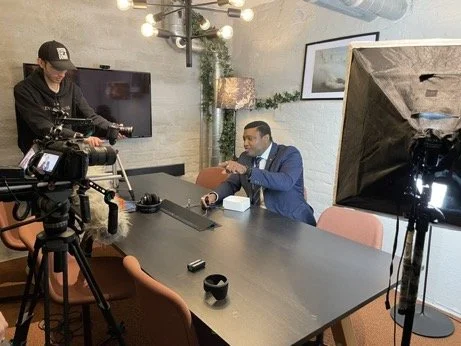THERE IS NO “LEGAL WAY” TO FIGHT FOR FREEDOM FROM A STATE SPONSOR OF TERRORISM.
Written by Nnamdi Iheukwumere
In the fraught arena of Nigeria's ethnic and political divisions, the case of Nnamdi Kanu, leader of the Indigenous People of Biafra (IPOB), exemplifies the futility of seeking justice through legal channels in a nation plagued by systemic oppression and violence. An
Recent events capture this sentiment starkly, asserting that true freedom cannot be won via courts in what Canadian federal court brands a "terrorist country." This perspective gains credence from international rulings, including a recent Canadian Federal Court decision that designated Nigeria's ruling All Progressives Congress (APC) and opposition Peoples Democratic Party (PDP) as terrorist organizations due to their involvement in electoral violence, subversion, and politically motivated killings.
As of September 2025, Kanu's ongoing detention and legal battles underscore how colonial legacies and modern judicial contradictions render peaceful self-determination an illusion. This article delves into the historical roots, key developments, and wider ramifications of Kanu's plight, highlighting why legal recourse in such a context is inherently flawed.
The Forced Union and Enduring Grievances
Nigeria's creation in 1914 as a British colonial construct forcibly amalgamated disparate ethnic groups without their input, sowing seeds of discord that persist today. For the Igbo people of the southeast, this has manifested in claims of systemic marginalization, economic neglect, and political exclusion—grievances that fueled the Nigerian Civil War (1967-1970). During that conflict, the short-lived Republic of Biafra's bid for independence ended in catastrophe, with estimates of 1-3 million deaths, largely from famine induced by blockades.
IPOB, established by Kanu in 2012, revives this call for Biafran sovereignty, positioning it as a remedy to ongoing injustices. Kanu, holding dual British-Biafran citizenship, amplified these demands via Radio Biafra, leading to his 2015 arrest on charges like terrorism and treason.
Granted bail in 2017, he escaped amid threats, only to be abducted in Kenya in 2021 and extraordinarily renditioned to Nigeria—a move that epitomizes the extralegal tactics of a state unwilling to entertain dissent.
This act now forms part of the investigations ongoing by US congress into Transnational Repression.
The Canadian court's August 2025 ruling further bolsters the view of Nigeria as a "terrorist country," as it proscribed the APC and PDP—parties that have dominated governance since 1999—for engaging in terrorism under Canadian immigration law. In denying asylum to former member Douglas Egharevba, the court cited evidence of ballot stuffing, voter intimidation, and murders during elections, affirming that mere affiliation with these parties constitutes grounds for inadmissibility.
Nigeria's government condemned the decision as "baseless" and an interference in its affairs, urging retraction, while both parties dismissed it as biased.Yet, this international condemnation exposes the hypocrisy: a nation quick to label groups like IPOB as terrorists now recoils when its own institutions face similar scrutiny.
The 2021 Abduction and Global Condemnations
Kanu's 2021 kidnapping in Nairobi, allegedly orchestrated with Kenyan complicity, bypassed extradition protocols, amounting to extraordinary rendition in violation of international norms. Detained in isolation and reportedly subjected to mistreatment, his case drew widespread rebuke.
On June 24, 2025, Kenya's High Court deemed the abduction unconstitutional, awarding Kanu 10 million Kenyan shillings (about ₦120 million) in damages for rights infringements. The ruling spotlighted collusion between Kenyan officials and foreign entities, flouting treaty commitments. IPOB celebrated it as a rebuke to Kenya and Nigeria, decrying arbitrary detention. Despite this, Nigeria ignores the verdict, testing its adherence to legal standards.
Such defiance aligns with the Canadian proscription, where courts abroad recognize the terror embedded in Nigeria's political machinery, rendering domestic or even international legal fights ineffective for those seeking freedom.
Nigerian Judicial Maze: Inconsistencies and Impunity
Kanu's trials in Nigeria reveal a web of contradictions. The Court of Appeal discharged him in October 2022, invalidating charges due to the illegal rendition. A stay order swiftly reinstated his detention, and the Supreme Court in December 2023 overturned the discharge, remanding the case despite procedural flaws.
The 2017 ban on IPOB as a terrorist group was upheld in January 2025, ignoring a 2023 nullification elsewhere. The UN Working Group on Arbitrary Detention has labeled his incarceration a human rights violation, criticizing limited access to lawyers and healthcare.
By September 2025, Kanu lingers in DSS custody. On July 18, 2025, Abuja's Federal High Court postponed a no-case ruling to October 10, rejecting government objections. Kanu insists no Nigerian court can fairly try him, citing prejudice. IPOB demands his release outright, faulting South-East leaders for pleading with President Bola Tinubu instead of leveraging rulings.
Wider Ramifications: The Illusion of Legal Self-Determination
Kanu's ordeal symbolizes the broader impossibility of legal paths to freedom in a "terrorist country,"
"You don’t need to secede from a company that you didn’t join in the first instance." The Canadian ruling amplifies this, with Justice Phuong T.V. Ngo affirming APC and PDP's terrorist status based on systemic violence, denying asylum without personal culpability proof.
Proponents see Nigeria's "unity" as coercive, perpetuating inequality. Detractors label IPOB divisive, citing violence from sit-at-home enforcements. The government portrays Kanu as a threat, justifying detention amid global criticisms.
BRGIE PM SIMON EKPA
As October 10 nears, the case probes Nigeria's judicial credibility and human rights stance. Ignoring Kenyan and Canadian rulings risks diplomatic fallout and unrest. Figures like Simon Ekpa, sentenced in Finland, extend the movement internationally.
Ultimately, Kanu's fight reveals that in a system where governing parties are internationally proscribed as terrorists, legal avenues are traps, not tools, for liberation. Until colonial-era fractures are addressed, demands for Biafran autonomy—and indictments of the state—will endure.
Nnamdi Kanu’s ordeal and Canadian and Kenyan courts ruling further exonerates PM Simon Ekpa as a freedom fighter.




